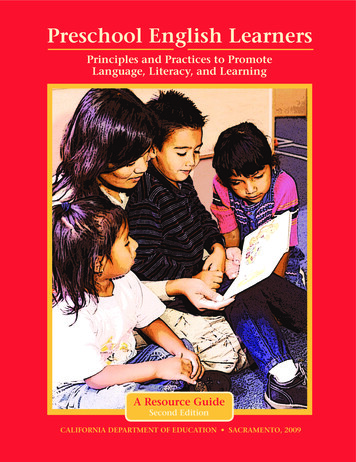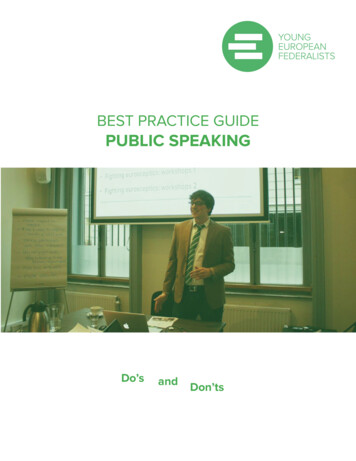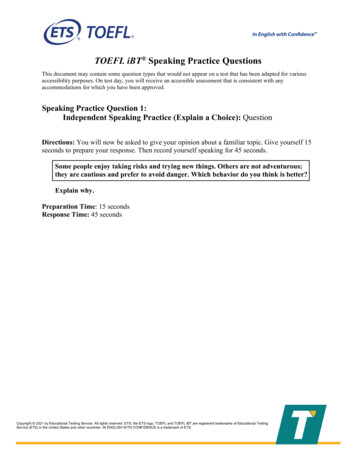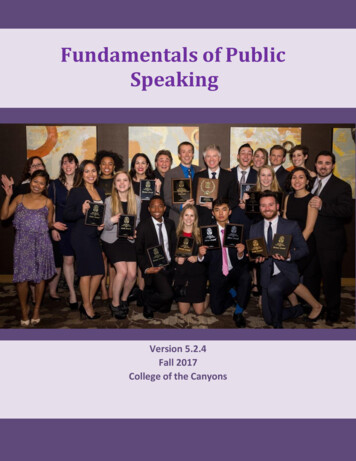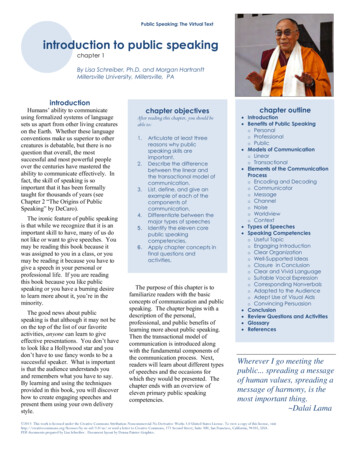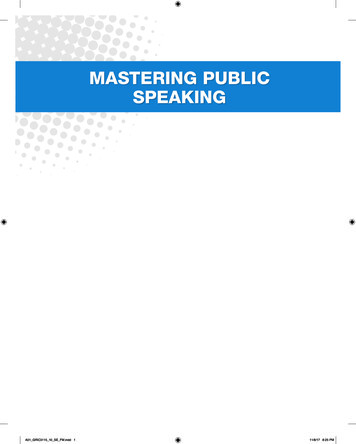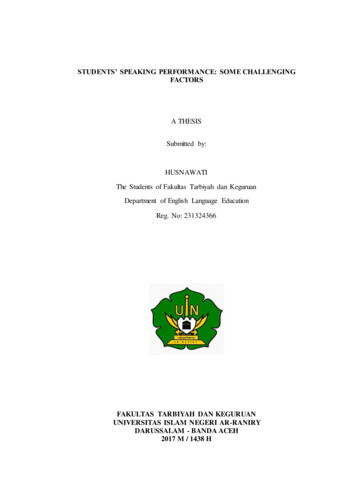
Transcription
STUDENTS’ SPEAKING PERFORMANCE: SOME CHALLENGINGFACTORSA THESISSubmitted by:HUSNAWATIThe Students of Fakultas Tarbiyah dan KeguruanDepartment of English Language EducationReg. No: 231324366FAKULTAS TARBIYAH DAN KEGURUANUNIVERSITAS ISLAM NEGERI AR-RANIRYDARUSSALAM - BANDA ACEH2017 M / 1438 H
ACKNOWLEDGEMENTSMy cordinal gratitude to the Almighty Allah for giving me blessful life, thestrength and ability to finish this research work. Peace and blessing be uponProphet Muhammad Saw whom together with his family and companions hasstruggled whole heartedly to guide his ummah to the right path.I would like to express my sincere gratitude and respect to my supervisors:Mr. Dr. Syarwan Ahmad M.LIS and Mr. Rahmat Yusny M.TESOL , who helped,supported, and encouraged me in the completion of this thesis. Then, thanks to myacademic advisor, Mr. Habiburrahim M. Com., M.S., Ph.D without his helpfulcomments, valuable advice and considerable assistance, this study could not havebeen completed. Futhermore, to the lecturers who permitting me conducting theresearch in his class and for being so kind all the time. Then, I want to thank allthe lecturers and staff members of the English Department, Ar-Raniry stateIslamic University for providing me best conditions to fulfill my study and to myjunior at UIN Ar-Raniry who helped me to collect data for the study.My special thanks to the most amazing people in my life, my family, forsupporting and motivating me to finish my study. To my dear mother YusnaRahimi for loving me and keep praying to god for my succesfull. To my belovedfather Abdurrahman Ubit for all his hardwork, unexpressed love, and sacriface.To my elder and younger brother M. Yani, M. Yasir, and M. Nasril forenternaining me during my hard time.i
Futhermore, I would also want to express my appreciation and love to mycolleagues, classmate, roommate, kost-mate, and especially for my best friendNurul Rusdi for always be there. Then, also to everybody who can’tbementioned one by one who supporting me either direct or indirectly.Banda Aceh, July 28th , 2017Husnawatiii
TABLE OF CONTENTSACKNOWLEDGEMENT . iLIST OF CONTENTS . iiiLIST OF TABLES .ivLIST OF FIGURES. vLIST OF APPENDICES .viDECLARATION OF ORIGINALITY . viiABSTRACT .ixCHAPTER 1 : INTRODUCTIONA. Background of Study. 1B. Research Question . 7C. Research Aim . 7D. Significance of Study . 7E. Terminology . 8F. Research Methods . 9CHAPTER II : LITERATURE REVIEWA. The nature of Speaking . 10B. FactorsAffecting Speaking Performance. 19C. Speaking Problems . 23D. Assessing Speaking . 26CHAPTER III : RESEARCH METHODOLOGYA. Brief Description of Research Location . 30B. Research Design . 33C. ResearchParticipants . 35D. Methods of Data Collection . 35E. Techniques of Data Analysis. 37CHAPTER IV : RESULT AND DISCUSSIONA. Observation Result . 39B. Questionaire Result . 41C. Discussion . 53CHAPTER V: CONCLUSION AND SUGGESTIONA. Conclusion. 56B. Suggestion . 57REFERENCES. 58APPENDICESAUTOBIOGRAPHYiii
LIST OF ETABLETABLETABLE: Data of students’ identity of unit 5 and 6. 31: How much do you like speaking English? . 41: How often do you practice speaking outside the classroom?.42: What do you think about the importance of Englishspeaking skills to your future career?. 444.4 : How do you feel in speaking class? . 454.5 : What factors affect your speaking performance? (choose 3factors that affect you the most) . 464.6 : Which problems do you encounter in learning speakingskill? (choose 3 factors that affect you the most) .474.7 : Related to language aspects, which problems youencountered in speaking? . 494.8 : What do you think about your English speaking skill? . 504.9 : You worry about doing badly before speaking English. 514.10 : You feel that others are better than you in speaking English. 521.14.14.24.3iv
LIST OF FIGURESPagesFIGURE 4.1 : How much do you like speaking English? .42FIGURE 4.2 : How often do you practice speaking outside the classroom?.43FIGURE 4.3 : What do you think about the importance of Englishspeaking skills to your future career?. 44FIGURE 4.4 : How do you feel in speaking class? . 45FIGURE 4.5 : What factors affect your speaking performance? (choose 3factors that affect you the most) . 47FIGURE 4.6 : Which problems do you encounter in learning speakingskill? (choose 3 factors that affect you the most) .48FIGURE 4.7 : Related to language aspects, which problems youencountered in speaking? . 49FIGURE 4.8 : What do you think about your English speaking skill? . 50FIGURE 4.9 : You worry about doing badly before speaking English. 51FIGURE 4.10 : You feel that others are better than you in speaking English. 52v
LIST OF APPENDICESI.Appointment Letter of SupervisorII.Recommendation Letter of Conducting Research From FakultasTarbiyah Dan KeguruanIII.Confirmation Letter of Conducted Research from English DepartmentIV.Instrument of The ResearchV.Sample of Students WorkVI.Autobiographyvi
ABSTRACTIn language learning, speaking has been well known as one of important aspectsof communication in which the ability of language learner measure by the abilityto carried out the language in oral communication. However, some of previousresearch revealed that for some foreign language learners, years experience inlearning English not yet very effective in encourage their ability to carry out anoral communication effectively. Therefore, the issues and experience as languagelearner inspirited the writer to conduct this research. This research was conductedin Department of English Language and Education at UIN Ar-Raniry. The subjectof the research was 52 English students of 4th semester who were taking publicspeaking course. In this research there are two speaking issues that writerinvestigated include factor affecting English speaking the performance oflanguage students and problem they encountered in speaking English. In order tocollect the data, observation and questionnaire was two research instrument used.Finally, the result of this research revealed that there are various factor affectingstudents performance, and problem students encountered in speaking. Thesefactors and problems refer to the internal and external factor include, psychology(anxiety, shyness, and lack confidence), linguistic competence (lack ofvocabulary, poor grammar knowledge), topical knowledge, performanceconditions (time pressure, planning, amount of support, etc), and learningenvironment.Key words: Challenging factor; speaking performance; speaking problems.vii
CHAPTER IINTRODUCTIONA. Background of StudyHuman beings can communicate with each other through a system ofcommunication, and our communication system before anything else is language.Language is communication system based upon words and words combinationinto sentences. In other words, communicating through language may refer to aslinguistic communication. Language is exclusively human property because otherlife beings do not speak through communication system like human use language.Therefore, this communication system is necessary for all human being. It helpsus to express feelings, desires, and most importantly it helps us interacting withone another.All around the world, there is no exact number how many languages usedby human. Ethnologue, a catalogue contains comprehensive research aboutlanguage in the world since 1951, surprisingly shown that about 7.102 languagesused by 7.106.865.256 human on earth (Lewis, Gary, & Charles, 2015).Becausethere are too many languages used by people in the world, there is severallanguages use globally to unite people from different places to be able to interactor communicate, work together, and share feeling, knowledge, or ideas. Thislanguage used known as lingua Franca.Officially, there are six languages considered as lingua franca used in theworld and officially recognizes by United Nations, include; Chinese, Spanish,1
2Russian, French, Arabic, and English. English as lingua franca (ELF) refers to theuse of English between people who do not share the same first language (Leyland,2011, p. 827). Even though lingua francas have been used for centuries, EFL isunique because of how widely it is used. ELF has been one of popular languagespoken in many countries both as native and as a second or foreign language. It isspoken as native language by around 377 million and as a second language byaround 375 speakers in the world (Crystal, 1997). Furthermore, it is taught atschool in almost every country in the world, including Indonesia. The currentstatus of English as international language is underpinned by its wide use in arange of fields such as politics, diplomacy, international trade and industry,commerce, science and technology, education, the media, and popular culture(Crystal, 2003; Huda, 2000, p. 68; Jenkins, 2003).Moreover, English is learnedeverywhere because people have found out that knowledge of English is essentialfor career success, advanced knowledge, and communicates with entire world.In Indonesia, English has been one of compulsory subject taught from theelementary to the university level. In university, English also one of collegemajors and important subject. It has been one of required course for students inany major. Therefore, English proficiency is important to student’s academicsuccess, especially for English Language students.In English language teaching and learning, there are four important macroskills that a person should master, one of them is speaking. Speaking is one of themost demanding skills in the daily life. Every people need to communicate withothers through speaking. Furthermore, it has become very important because it
3plays an important role in any life aspects. Through speaking people can transferideas, opinion, and knowledge with others. Moreover, people who use a languageusually pertain to be able to speak in that language (Ur, 1996). Consequently,speaking is generally thought to be the most important of the four skills. Daviesand Pearse as cited in Tuan and Mai (2015) stated that making the learners able tospeak English accurately and effectively in communication is the main goal of anyEnglish language teaching.Speaking itself contains several other skills called micro skills. These microskills include: a part of speaking which should be mastered by a language learnerin order to make communication become more effective and accurate. Therefore,a good speaking skill is very important and essential.In fact, good communication skill is not only essential for good achievementin academic life but also for a successful future career. In every organization,leader,manager, supervisor, and employee, effective communication is animportant element of success. It does not only help you get the job you want butalso help you become more successful in the job you have. Furthermore, Hybelsand Weaver (2004) stated that;“Many people believe that effective communication is the key tosuccess in our work and in our relationships. In a survey sent to 1000personnel managers, the managers listed oral communication andlistening as the most important skills for gaining employment. Forpeople who were on the job, they said, the abilities to work with othersand to speak effectively were most important. In another survey,college alumni responded that the most important skills for their jobswere making presentations and handling questions and answers andsmall-group discussion. Finally, research has shown that training incommunication in the workplace helps participants improve their
4skills, particularly in presentations, and that students who take acommunication class perceive their communication skills asimproving." (Hybels & Weaver, 2004, p.5-6)Through communication people can show ideas and knowledge easily andclearly. It is a good way to show capabilities. It could be said that knowledge is oflimited value if it is not applied, which through communication, we can show thatwe are knowledgeable. Therefore, having a good communication skill is veryessential.Nonetheless, not all language learners after many years studying Englishcan communicate fluently, and accurately. They tend to have low performancewhen they have to communicate or speak up in front of the other. Therefore it hasbecome one of popular issues in language learning for recent years.Several researches related to communication skill have been carried out.Bozorgian (2012) carried out a study to examine the relationship of listening skillwith other language skills. The results of this study indicated a close correlationbetween listening comprehension and language proficiency. He stated that thehigher the listening score, the better the speaking score. Park and Lee (2005)examined the relationships between second language learners' anxiety, selfconfidence, and speaking performance. The participants of the study were one 132Korean college students enrolled in the English conversation classes. In addition,Salem & Dyiar (2014) conducted a research investigating the relationship betweenspeaking anxiety and oral fluency of Arab intermediate school students also thedifferences between male and female students in speaking anxiety profile withtheir oral fluency performance. Results of the study showed that there are positive
5relation between student speaking anxiety and their performance in oralperformance skills of male students and the total sample of the study. It is alsofound that no relations were found between female students speaking anxiety andtheir oral fluency performance. Findings indicated that there were statisticallysignificant differences between male and female students in oral fluency in favorof male students. So, the research revealed that gender plays a role in the students’ability.However, besides such factor as: gender, other skill and psychological factorsuch anxiety, this problem might be affected by some other important factors thatmay come from inside or outside students-self, either related to their ability orpsychology. Even though several other researches related to this issue have beenconducted, the writer sure that there are always something new that could befound. Moreover, each study might have various finding depending on subjects(student) school level, place, and time. Therefore, this research is conducted toinvestigate the factors and problems related to students speaking performance.The research took place at UIN Ar-Raniry Banda Aceh. According to someprevious research that were conducted in this university, some English Languageand Education students still have a low English-speaking ability and problem inspeaking English. Akbar (2011) conducted a research to find out the correlationbetween self confidence and oral performance. The population of the study was 75students of Department of English Language and Education students who tookspeaking III class, and 22 of them were taken as sample. Three research methods;observation, questionnaire, and oral performance test were used to collect the
6data. The result of data analysis shown that there were no significant effects ofstudents’ self confident and their oral performance; the higher confident theywere, the higher oral performance they showed. Yet, the result also showed thatsome students who have high self confidence are more capable in oralperformance ability than the students who have low self confidence. Moreover,Putri (2016) conducted the study analyzed the effects of speaking anxiety towardstudents’ speaking ability in English classroom. The subject of her study was 10students of Department of English Language Education at Fakultas Tarbiyah danKeguruan of UIN Ar-Raniry. In collecting data questionnaire and interview wasused. The result of the study showed that speaking anxiety caused some negativeeffects to learners speaking ability. Moreover, Cayarani (2014) investigated thecorrelation between students’ self-esteem and their academic achievement inspeaking. The qualitative research by descriptive correlative design was used tocollect the data. The population of her study was 310 first year students atDepartment of English Language Education and 52 students were used as sample.The result of the study found that self-esteem and speaking achievement was notcorrelate each other and there must be other factors which more related tospeaking achievement. The writer suggested to further researchers to investigateother factors besides self-esteem. Moreover, the writer was motivated to conductmore research regarding to this issues because some previous research proven thatstudents still have problem in speaking English. Furthermore, the teachers need toknow the factors that affect their students' speaking performance so that they candeal with these factors to help the students improve their speaking performance.
7Therefore, the study seeks to investigate the factors affecting studentsspeaking performance of English Language and Education students in academicyears 2017 at UIN Ar-Raniry.B. Research QuestionsBased on the background of the study, some problems that can beinvestigated related to students speaking performance are:1) What are the challengingfactorsthat affectstudents’speakingperformance?2) What are the problems faced by students in speaking English?C. Research AimsRegarding to the background and research questions above, this study isconducted to meet the following objectives:1) To determine the challenging factors that affect students’ English speakingperformance.2) To find out the problems encountered by students in speaking.D. Significance of StudyThe writer expects that this study will give some contributions in ficance contributions gained from this study;Thefollowingaretwo
81) The finding from this study will educate the stakeholders in the educationsector and the general public on the factors that can influence student’sspeaking performance to better understanding and solution.2) This research will also serve as a resource base to other scholars andresearchers interested in carrying out further research in this field.E. TerminologyTo avoid misunderstanding and misinterpreting of the meaning in the title ofthis study, the writer provides the meaning of terms used in the research entitled“Students' Speaking Performance: Some Challenging Factors ", as below:1) Speaking performanceAccording to Brown, speaking is an interactive process of constructing themeaning that involves producing, receiving, and processing information(Brown, 1994), and “Performance, denotes the production of actualutterances as a result of certain psychological processes” (De Kort &Leerdam as cited in Hemerka, 2009, p. 15)2) Challenging factorsLowes, Peters, and Turner (2004) stated that “Challenge is somethingneeding great mental or physical effort in order to be done successfullyand which therefore tests a person’s ability. Challenging is a difficulties, ina way that test your ability or determination” (p. 88). Based on definitionsstated above, challenging is something difficult which test ability andinvolving physical and mental involvement. In this research, challenging
9factors refer to factor that influence students’ ability and performance inspeaking English.F. Research MethodThis research was designed by using quantitative and qualitative design,because the focus of study were to find out the problems encountered by studentsin speaking and determine the challenging factors that affect students’ speakingperformance. Creswell (2008) states that mixed method research is a researchdesign philosophical assumption as well as methods of inquiry. Mixed methodfocuses on collecting, analyzing, and mixing both quantitative and qualitative datain a single study or series of studies. The main premise is that the use ofquantitative and qualitative approach provides a better understanding of researchproblems compared with each approach.
CHAPTER IILITERATURE REVIEWA. The Nature of Speaking1. Definition of SpeakingSpeaking is one of the macro skills of English language teaching andlearning. It is not easy to define what is meant by terms such as speaking skillsince it has been defined in various ways in different disciplines. In languageteaching and learning itself, many definitions of speaking have been maderegarding to some experts. According to David Nunan “Speaking is the singlemost important aspect of learning a second or foreign language, and success ismeasured in terms of the ability to carry out a conversation in the language”(1991, p. 39). Moreover, Brown (1994) and Burns & Joyce (1997) definespeaking is an interactive process of constructing meaning thatinvolvesproducing and receiving and processing information.Furthermore, in language teaching and learning, speaking is considered asability to be practiced and mastered. Nunan (2003, p. 48) puts it that “speaking isthe productive oral skill. It consists of producing systematic verbal utterance toconvey meaning”.Finally, based on definition given by experts above, it can be inferred thatspeaking is a process of expressing ideas in the spoken language, and it is one ofmost important aspect of language learning. Further, Luoma (2004) stated that“being able to speak to friends, colleagues, visitors and even strangers, in their10
11language or in a language which both speakers can understand, is surely the goalof very many learners” and the success of learning English can be seen andmeasured from their performance in speaking and how well they present theirEnglish in communication.2. The Importance of SpeakingAs one of communication system, speaking play an important part in oureveryday lives. In any life aspect, either our social or personal interaction, theability to speak has been one of significant element of interaction process.Furthermore, in language teaching and learning it speaking is an important part ofcurriculum (Luoma, 2004).In social interaction, the ability to speak effectively supports how far ourinteraction going and how well relationship can be achieved. Then, in workplaceor career lives communication skill is one of main key for career success. Forinstance, a leader need communication ability to deliver information, influence,and direct others to take the actions. Personally, we also need communication skillto show our ability and capability. Our personality, self-image, knowledge of theworld, and our ability to reason and express our thoughts is all reflected in ourspoken performance in the target language (Luoma, 2004).Nowadays, effective speaking has received a lot of attention from thegeneral public. It is has been one of the prominent qualities that can help you getthe attention of other people. Naturally, we are all a great fan of such effective
12speaking skill. Finally, speaking skill has been very important, since it is one ofdemanded skill that mostly used in communication.3. Functions of SpeakingAccording to Richard (2008), the mastery of speaking skills in English is apriority for many second and foreign language learners. Several language expertshave attempted to categorize the functions of speaking in human interaction.According to Brown and Yule there are three function of speaking, “ three partversion of Brown and Yule’s framework (after Jones 1996 & Burns 1998): talksas interaction: talk as transaction: talk as performance. Each of these speechactivities is quite distinct in term of form and function and requires differentteaching approaches.”(Richards, 2008, p. 24)a. Talk as interactionTalk as interaction refers to what we said as conversation. It is aninteractive communication which done spontaneous by two or moreperson. This is about how people try to convey his message to otherpeople. Therefore, they must use speaking skill to communicate to otherperson. The main intention in this function is social relationship. The focusis more on the speakers and how they wish to present themselves to eachother than on the message.b. Talk as transactionIn talk as transaction is focus more on message that conveyed and makingothers person understand what we want convey, by clearly and accurately.
13In this type of spoken language, students and teacher usually focus onmeaning or talking what their way to understanding rather than interaction.c. Talk as performanceIn this case, speaking activities is focus more on monolog rather thandialog. The function of speaking as performance happened at speeches,public talks, public announcements, retell story, telling story and so on.4. Aspects of Speaking PerformancesSpeaking becomes important because speaking is a skill that can makepeople easily understand to what things explained. Students’ speaking ability isexpected to be good because they have learned English since some years beforeand they will have many performances related to oral skill in universities. But infact, even college students’ speaking ability is still low. It is difficult for them tofulfill some aspects of speaking performance. These aspects of speakingperformance included:a. AccuracyAccording to Nunan (2015), accuracy refers to the extent to which clear,intelligiblepronunciation and appropriate choice of vocabulary.b. FluencyFluency is the extent to which the learner can speak at an acceptable speedwith few false starts and hesitations (Nunan, 2015). Lade (1961, p. 240)points out that speaking ability is described as the ability to report acts or
14situation, in precise words, or the ability to converse or to express asequence of ideas fluently. Research into listener’s perception suggests thatpausing is one of the factors of fluency (Thornbury, 2005, p.6-7).Furthermore, Thornbury (2005, p. 8) states that people can be said asfluent speakers if they fulfill the following features:a) Pauses may be long but not frequentb) Pauses are usually filledc) Pauses occur at meaningful transition pointsd) There are long runs of syllables and words between pausesFoster and Skehan in Nunan (2004, p. 87) propose a model in assessingspeaking in which fluency is measured by considering the total number ofseconds of silence and time spent saying ‘um’ and ‘ah’ by subjects as theycomplete a task.c. PronunciationAccording to Thornbury (2005, p. 128-129), pronunciation refers to thestudent’s ability to produce comprehensible utterances to fulfill the taskrequirements. Harmer (2001, p. 28-33) provides more issues related topronunciation. He suggests pitch, intonation, individual sounds, soundsand spelling, and stress. Pronunciation becomes important because it givesmeaning towhat is being said.Wrong pronunciation may causemisunderstanding or people involved in a conversation are offended.
15d. GrammarAccording to Brown (2001, p. 62) “Grammar is the system of rulesgoverning the conventional arrangement and relationship of words in asentence”. In relation to contexts, a speaker should consider the followingthings:a) Who the speaker isb) Who the audience isc) Where the communication takes placed) What commu
of the research was 52 English students of 4th semester who were taking public speaking course. In this research there are two speaking issues that writer investigated include factor affecting English speaking the performance of language students and problem they enco
